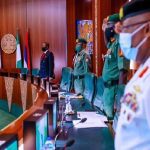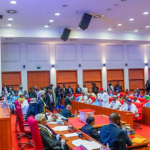In Nigeria, the role of service chiefs in ensuring national security is of paramount importance. These military officers, appointed by the President, bear the responsibility of safeguarding the nation against internal and external threats. However, the effectiveness of service chiefs in addressing security challenges has been a subject of intense debate in recent years.
In this article, TVC News Senior Executive, Digital and Social Media, Wasiu Salami analyses the role of service chiefs in Nigeria’s national security and explore the challenges they face while highlighting potential prospects for improvement.
The Significance of Service Chiefs:
Service chiefs in Nigeria, comprising the Chief of Defense Staff (CDS) and the heads of the Nigerian Army, Nigerian Navy, and Nigerian Air Force, play a crucial role in maintaining the country’s security. They oversee military operations, coordinate strategies, and provide advice to the President on matters relating to national security. Their leadership and decision-making directly impact the success of counterinsurgency efforts, border protection, and overall defense architecture.
Challenges Faced by Service Chiefs:
a) Insurgency and Terrorism: Nigeria has grappled with the Boko Haram insurgency in the northeast for over a decade. Service chiefs face the daunting task of eradicating this menace while also tackling emerging threats such as banditry, kidnapping, and farmer-herder conflicts in different parts of the country.
b) Inadequate Funding: Insufficient budgetary allocations to the defense sector pose a significant challenge to service chiefs. Limited resources hamper capacity-building, procurement of modern equipment, and the welfare of military personnel. Adequate funding is crucial to enhancing operational efficiency and improving the morale of the armed forces.
c) Interagency Coordination: Collaboration and synergy among the various security agencies are essential for effective national security. Service chiefs must navigate complex relationships and establish cohesive coordination mechanisms to maximize resources, intelligence sharing, and joint operations.
d) Corruption and Misconduct: Instances of corruption and misconduct within the military can undermine operational effectiveness and erode public trust. Service chiefs must prioritize discipline, integrity, and accountability within their ranks to maintain a professional and credible force.
Prospects for Improvement:
a) Strategic Planning and Intelligence: Service chiefs should focus on proactive intelligence gathering, analysis, and dissemination to anticipate and preempt security threats. Utilizing technology, developing a robust intelligence network, and engaging with international partners can significantly enhance Nigeria’s security apparatus.
b) Capacity Building and Modernization: Adequate investment in training, equipment, and technology is vital to improve the capabilities of the armed forces. Service chiefs should prioritize the professional development of personnel, ensuring they are equipped with the necessary skills and knowledge to combat evolving security challenges.
c) Civil-Military Relations: Strengthening the relationship between the military and civil society is crucial for effective security governance. Service chiefs should foster transparency, engage with communities, and prioritize respect for human rights in military operations to gain public support and cooperation.
d) Legislative Reforms: Collaboration between the executive and legislative branches is crucial for enacting laws that support national security objectives. Service chiefs should engage with lawmakers to advocate for legal frameworks that enhance their operational efficiency while ensuring respect for human rights and the rule of law.
Conclusion:
Service chiefs in Nigeria play a pivotal role in maintaining national security amidst a complex and evolving threat landscape. While challenges such as insurgency, funding constraints, interagency coordination, and misconduct persist, there are prospects for improvement through strategic planning, capacity building, enhanced civil-military relations, and legislative reforms. By addressing these challenges and capitalizing on opportunities, Nigeria can strengthen its security architecture and provide a safer environment for its citizens. Achieving this goal requires a concerted effort from all stakeholders, including the government, military leadership, civil society, and the citizenry as a whole.
In Nigeria, the role of service chiefs in ensuring national security is of paramount importance. These military officers, appointed by the President, bear the responsibility of safeguarding the nation against internal and external threats. However, the effectiveness of service chiefs in addressing security challenges has been a subject of intense debate in recent years.
In this article, TVC News Senior Executive, Digital and Social Media, Wasiu Salami analyses the role of service chiefs in Nigeria’s national security and explore the challenges they face while highlighting potential prospects for improvement.
The Significance of Service Chiefs:
Service chiefs in Nigeria, comprising the Chief of Defense Staff (CDS) and the heads of the Nigerian Army, Nigerian Navy, and Nigerian Air Force, play a crucial role in maintaining the country’s security. They oversee military operations, coordinate strategies, and provide advice to the President on matters relating to national security. Their leadership and decision-making directly impact the success of counterinsurgency efforts, border protection, and overall defense architecture.
Challenges Faced by Service Chiefs:
a) Insurgency and Terrorism: Nigeria has grappled with the Boko Haram insurgency in the northeast for over a decade. Service chiefs face the daunting task of eradicating this menace while also tackling emerging threats such as banditry, kidnapping, and farmer-herder conflicts in different parts of the country.
b) Inadequate Funding: Insufficient budgetary allocations to the defense sector pose a significant challenge to service chiefs. Limited resources hamper capacity-building, procurement of modern equipment, and the welfare of military personnel. Adequate funding is crucial to enhancing operational efficiency and improving the morale of the armed forces.
c) Interagency Coordination: Collaboration and synergy among the various security agencies are essential for effective national security. Service chiefs must navigate complex relationships and establish cohesive coordination mechanisms to maximize resources, intelligence sharing, and joint operations.
d) Corruption and Misconduct: Instances of corruption and misconduct within the military can undermine operational effectiveness and erode public trust. Service chiefs must prioritize discipline, integrity, and accountability within their ranks to maintain a professional and credible force.
Prospects for Improvement:
a) Strategic Planning and Intelligence: Service chiefs should focus on proactive intelligence gathering, analysis, and dissemination to anticipate and preempt security threats. Utilizing technology, developing a robust intelligence network, and engaging with international partners can significantly enhance Nigeria’s security apparatus.
b) Capacity Building and Modernization: Adequate investment in training, equipment, and technology is vital to improve the capabilities of the armed forces. Service chiefs should prioritize the professional development of personnel, ensuring they are equipped with the necessary skills and knowledge to combat evolving security challenges.
c) Civil-Military Relations: Strengthening the relationship between the military and civil society is crucial for effective security governance. Service chiefs should foster transparency, engage with communities, and prioritize respect for human rights in military operations to gain public support and cooperation.
d) Legislative Reforms: Collaboration between the executive and legislative branches is crucial for enacting laws that support national security objectives. Service chiefs should engage with lawmakers to advocate for legal frameworks that enhance their operational efficiency while ensuring respect for human rights and the rule of law.
Conclusion:
Service chiefs in Nigeria play a pivotal role in maintaining national security amidst a complex and evolving threat landscape. While challenges such as insurgency, funding constraints, interagency coordination, and misconduct persist, there are prospects for improvement through strategic planning, capacity building, enhanced civil-military relations, and legislative reforms. By addressing these challenges and capitalizing on opportunities, Nigeria can strengthen its security architecture and provide a safer environment for its citizens. Achieving this goal requires a concerted effort from all stakeholders, including the government, military leadership, civil society, and the citizenry as a whole.
In Nigeria, the role of service chiefs in ensuring national security is of paramount importance. These military officers, appointed by the President, bear the responsibility of safeguarding the nation against internal and external threats. However, the effectiveness of service chiefs in addressing security challenges has been a subject of intense debate in recent years.
In this article, TVC News Senior Executive, Digital and Social Media, Wasiu Salami analyses the role of service chiefs in Nigeria’s national security and explore the challenges they face while highlighting potential prospects for improvement.
The Significance of Service Chiefs:
Service chiefs in Nigeria, comprising the Chief of Defense Staff (CDS) and the heads of the Nigerian Army, Nigerian Navy, and Nigerian Air Force, play a crucial role in maintaining the country’s security. They oversee military operations, coordinate strategies, and provide advice to the President on matters relating to national security. Their leadership and decision-making directly impact the success of counterinsurgency efforts, border protection, and overall defense architecture.
Challenges Faced by Service Chiefs:
a) Insurgency and Terrorism: Nigeria has grappled with the Boko Haram insurgency in the northeast for over a decade. Service chiefs face the daunting task of eradicating this menace while also tackling emerging threats such as banditry, kidnapping, and farmer-herder conflicts in different parts of the country.
b) Inadequate Funding: Insufficient budgetary allocations to the defense sector pose a significant challenge to service chiefs. Limited resources hamper capacity-building, procurement of modern equipment, and the welfare of military personnel. Adequate funding is crucial to enhancing operational efficiency and improving the morale of the armed forces.
c) Interagency Coordination: Collaboration and synergy among the various security agencies are essential for effective national security. Service chiefs must navigate complex relationships and establish cohesive coordination mechanisms to maximize resources, intelligence sharing, and joint operations.
d) Corruption and Misconduct: Instances of corruption and misconduct within the military can undermine operational effectiveness and erode public trust. Service chiefs must prioritize discipline, integrity, and accountability within their ranks to maintain a professional and credible force.
Prospects for Improvement:
a) Strategic Planning and Intelligence: Service chiefs should focus on proactive intelligence gathering, analysis, and dissemination to anticipate and preempt security threats. Utilizing technology, developing a robust intelligence network, and engaging with international partners can significantly enhance Nigeria’s security apparatus.
b) Capacity Building and Modernization: Adequate investment in training, equipment, and technology is vital to improve the capabilities of the armed forces. Service chiefs should prioritize the professional development of personnel, ensuring they are equipped with the necessary skills and knowledge to combat evolving security challenges.
c) Civil-Military Relations: Strengthening the relationship between the military and civil society is crucial for effective security governance. Service chiefs should foster transparency, engage with communities, and prioritize respect for human rights in military operations to gain public support and cooperation.
d) Legislative Reforms: Collaboration between the executive and legislative branches is crucial for enacting laws that support national security objectives. Service chiefs should engage with lawmakers to advocate for legal frameworks that enhance their operational efficiency while ensuring respect for human rights and the rule of law.
Conclusion:
Service chiefs in Nigeria play a pivotal role in maintaining national security amidst a complex and evolving threat landscape. While challenges such as insurgency, funding constraints, interagency coordination, and misconduct persist, there are prospects for improvement through strategic planning, capacity building, enhanced civil-military relations, and legislative reforms. By addressing these challenges and capitalizing on opportunities, Nigeria can strengthen its security architecture and provide a safer environment for its citizens. Achieving this goal requires a concerted effort from all stakeholders, including the government, military leadership, civil society, and the citizenry as a whole.
In Nigeria, the role of service chiefs in ensuring national security is of paramount importance. These military officers, appointed by the President, bear the responsibility of safeguarding the nation against internal and external threats. However, the effectiveness of service chiefs in addressing security challenges has been a subject of intense debate in recent years.
In this article, TVC News Senior Executive, Digital and Social Media, Wasiu Salami analyses the role of service chiefs in Nigeria’s national security and explore the challenges they face while highlighting potential prospects for improvement.
The Significance of Service Chiefs:
Service chiefs in Nigeria, comprising the Chief of Defense Staff (CDS) and the heads of the Nigerian Army, Nigerian Navy, and Nigerian Air Force, play a crucial role in maintaining the country’s security. They oversee military operations, coordinate strategies, and provide advice to the President on matters relating to national security. Their leadership and decision-making directly impact the success of counterinsurgency efforts, border protection, and overall defense architecture.
Challenges Faced by Service Chiefs:
a) Insurgency and Terrorism: Nigeria has grappled with the Boko Haram insurgency in the northeast for over a decade. Service chiefs face the daunting task of eradicating this menace while also tackling emerging threats such as banditry, kidnapping, and farmer-herder conflicts in different parts of the country.
b) Inadequate Funding: Insufficient budgetary allocations to the defense sector pose a significant challenge to service chiefs. Limited resources hamper capacity-building, procurement of modern equipment, and the welfare of military personnel. Adequate funding is crucial to enhancing operational efficiency and improving the morale of the armed forces.
c) Interagency Coordination: Collaboration and synergy among the various security agencies are essential for effective national security. Service chiefs must navigate complex relationships and establish cohesive coordination mechanisms to maximize resources, intelligence sharing, and joint operations.
d) Corruption and Misconduct: Instances of corruption and misconduct within the military can undermine operational effectiveness and erode public trust. Service chiefs must prioritize discipline, integrity, and accountability within their ranks to maintain a professional and credible force.
Prospects for Improvement:
a) Strategic Planning and Intelligence: Service chiefs should focus on proactive intelligence gathering, analysis, and dissemination to anticipate and preempt security threats. Utilizing technology, developing a robust intelligence network, and engaging with international partners can significantly enhance Nigeria’s security apparatus.
b) Capacity Building and Modernization: Adequate investment in training, equipment, and technology is vital to improve the capabilities of the armed forces. Service chiefs should prioritize the professional development of personnel, ensuring they are equipped with the necessary skills and knowledge to combat evolving security challenges.
c) Civil-Military Relations: Strengthening the relationship between the military and civil society is crucial for effective security governance. Service chiefs should foster transparency, engage with communities, and prioritize respect for human rights in military operations to gain public support and cooperation.
d) Legislative Reforms: Collaboration between the executive and legislative branches is crucial for enacting laws that support national security objectives. Service chiefs should engage with lawmakers to advocate for legal frameworks that enhance their operational efficiency while ensuring respect for human rights and the rule of law.
Conclusion:
Service chiefs in Nigeria play a pivotal role in maintaining national security amidst a complex and evolving threat landscape. While challenges such as insurgency, funding constraints, interagency coordination, and misconduct persist, there are prospects for improvement through strategic planning, capacity building, enhanced civil-military relations, and legislative reforms. By addressing these challenges and capitalizing on opportunities, Nigeria can strengthen its security architecture and provide a safer environment for its citizens. Achieving this goal requires a concerted effort from all stakeholders, including the government, military leadership, civil society, and the citizenry as a whole.
In Nigeria, the role of service chiefs in ensuring national security is of paramount importance. These military officers, appointed by the President, bear the responsibility of safeguarding the nation against internal and external threats. However, the effectiveness of service chiefs in addressing security challenges has been a subject of intense debate in recent years.
In this article, TVC News Senior Executive, Digital and Social Media, Wasiu Salami analyses the role of service chiefs in Nigeria’s national security and explore the challenges they face while highlighting potential prospects for improvement.
The Significance of Service Chiefs:
Service chiefs in Nigeria, comprising the Chief of Defense Staff (CDS) and the heads of the Nigerian Army, Nigerian Navy, and Nigerian Air Force, play a crucial role in maintaining the country’s security. They oversee military operations, coordinate strategies, and provide advice to the President on matters relating to national security. Their leadership and decision-making directly impact the success of counterinsurgency efforts, border protection, and overall defense architecture.
Challenges Faced by Service Chiefs:
a) Insurgency and Terrorism: Nigeria has grappled with the Boko Haram insurgency in the northeast for over a decade. Service chiefs face the daunting task of eradicating this menace while also tackling emerging threats such as banditry, kidnapping, and farmer-herder conflicts in different parts of the country.
b) Inadequate Funding: Insufficient budgetary allocations to the defense sector pose a significant challenge to service chiefs. Limited resources hamper capacity-building, procurement of modern equipment, and the welfare of military personnel. Adequate funding is crucial to enhancing operational efficiency and improving the morale of the armed forces.
c) Interagency Coordination: Collaboration and synergy among the various security agencies are essential for effective national security. Service chiefs must navigate complex relationships and establish cohesive coordination mechanisms to maximize resources, intelligence sharing, and joint operations.
d) Corruption and Misconduct: Instances of corruption and misconduct within the military can undermine operational effectiveness and erode public trust. Service chiefs must prioritize discipline, integrity, and accountability within their ranks to maintain a professional and credible force.
Prospects for Improvement:
a) Strategic Planning and Intelligence: Service chiefs should focus on proactive intelligence gathering, analysis, and dissemination to anticipate and preempt security threats. Utilizing technology, developing a robust intelligence network, and engaging with international partners can significantly enhance Nigeria’s security apparatus.
b) Capacity Building and Modernization: Adequate investment in training, equipment, and technology is vital to improve the capabilities of the armed forces. Service chiefs should prioritize the professional development of personnel, ensuring they are equipped with the necessary skills and knowledge to combat evolving security challenges.
c) Civil-Military Relations: Strengthening the relationship between the military and civil society is crucial for effective security governance. Service chiefs should foster transparency, engage with communities, and prioritize respect for human rights in military operations to gain public support and cooperation.
d) Legislative Reforms: Collaboration between the executive and legislative branches is crucial for enacting laws that support national security objectives. Service chiefs should engage with lawmakers to advocate for legal frameworks that enhance their operational efficiency while ensuring respect for human rights and the rule of law.
Conclusion:
Service chiefs in Nigeria play a pivotal role in maintaining national security amidst a complex and evolving threat landscape. While challenges such as insurgency, funding constraints, interagency coordination, and misconduct persist, there are prospects for improvement through strategic planning, capacity building, enhanced civil-military relations, and legislative reforms. By addressing these challenges and capitalizing on opportunities, Nigeria can strengthen its security architecture and provide a safer environment for its citizens. Achieving this goal requires a concerted effort from all stakeholders, including the government, military leadership, civil society, and the citizenry as a whole.
In Nigeria, the role of service chiefs in ensuring national security is of paramount importance. These military officers, appointed by the President, bear the responsibility of safeguarding the nation against internal and external threats. However, the effectiveness of service chiefs in addressing security challenges has been a subject of intense debate in recent years.
In this article, TVC News Senior Executive, Digital and Social Media, Wasiu Salami analyses the role of service chiefs in Nigeria’s national security and explore the challenges they face while highlighting potential prospects for improvement.
The Significance of Service Chiefs:
Service chiefs in Nigeria, comprising the Chief of Defense Staff (CDS) and the heads of the Nigerian Army, Nigerian Navy, and Nigerian Air Force, play a crucial role in maintaining the country’s security. They oversee military operations, coordinate strategies, and provide advice to the President on matters relating to national security. Their leadership and decision-making directly impact the success of counterinsurgency efforts, border protection, and overall defense architecture.
Challenges Faced by Service Chiefs:
a) Insurgency and Terrorism: Nigeria has grappled with the Boko Haram insurgency in the northeast for over a decade. Service chiefs face the daunting task of eradicating this menace while also tackling emerging threats such as banditry, kidnapping, and farmer-herder conflicts in different parts of the country.
b) Inadequate Funding: Insufficient budgetary allocations to the defense sector pose a significant challenge to service chiefs. Limited resources hamper capacity-building, procurement of modern equipment, and the welfare of military personnel. Adequate funding is crucial to enhancing operational efficiency and improving the morale of the armed forces.
c) Interagency Coordination: Collaboration and synergy among the various security agencies are essential for effective national security. Service chiefs must navigate complex relationships and establish cohesive coordination mechanisms to maximize resources, intelligence sharing, and joint operations.
d) Corruption and Misconduct: Instances of corruption and misconduct within the military can undermine operational effectiveness and erode public trust. Service chiefs must prioritize discipline, integrity, and accountability within their ranks to maintain a professional and credible force.
Prospects for Improvement:
a) Strategic Planning and Intelligence: Service chiefs should focus on proactive intelligence gathering, analysis, and dissemination to anticipate and preempt security threats. Utilizing technology, developing a robust intelligence network, and engaging with international partners can significantly enhance Nigeria’s security apparatus.
b) Capacity Building and Modernization: Adequate investment in training, equipment, and technology is vital to improve the capabilities of the armed forces. Service chiefs should prioritize the professional development of personnel, ensuring they are equipped with the necessary skills and knowledge to combat evolving security challenges.
c) Civil-Military Relations: Strengthening the relationship between the military and civil society is crucial for effective security governance. Service chiefs should foster transparency, engage with communities, and prioritize respect for human rights in military operations to gain public support and cooperation.
d) Legislative Reforms: Collaboration between the executive and legislative branches is crucial for enacting laws that support national security objectives. Service chiefs should engage with lawmakers to advocate for legal frameworks that enhance their operational efficiency while ensuring respect for human rights and the rule of law.
Conclusion:
Service chiefs in Nigeria play a pivotal role in maintaining national security amidst a complex and evolving threat landscape. While challenges such as insurgency, funding constraints, interagency coordination, and misconduct persist, there are prospects for improvement through strategic planning, capacity building, enhanced civil-military relations, and legislative reforms. By addressing these challenges and capitalizing on opportunities, Nigeria can strengthen its security architecture and provide a safer environment for its citizens. Achieving this goal requires a concerted effort from all stakeholders, including the government, military leadership, civil society, and the citizenry as a whole.
In Nigeria, the role of service chiefs in ensuring national security is of paramount importance. These military officers, appointed by the President, bear the responsibility of safeguarding the nation against internal and external threats. However, the effectiveness of service chiefs in addressing security challenges has been a subject of intense debate in recent years.
In this article, TVC News Senior Executive, Digital and Social Media, Wasiu Salami analyses the role of service chiefs in Nigeria’s national security and explore the challenges they face while highlighting potential prospects for improvement.
The Significance of Service Chiefs:
Service chiefs in Nigeria, comprising the Chief of Defense Staff (CDS) and the heads of the Nigerian Army, Nigerian Navy, and Nigerian Air Force, play a crucial role in maintaining the country’s security. They oversee military operations, coordinate strategies, and provide advice to the President on matters relating to national security. Their leadership and decision-making directly impact the success of counterinsurgency efforts, border protection, and overall defense architecture.
Challenges Faced by Service Chiefs:
a) Insurgency and Terrorism: Nigeria has grappled with the Boko Haram insurgency in the northeast for over a decade. Service chiefs face the daunting task of eradicating this menace while also tackling emerging threats such as banditry, kidnapping, and farmer-herder conflicts in different parts of the country.
b) Inadequate Funding: Insufficient budgetary allocations to the defense sector pose a significant challenge to service chiefs. Limited resources hamper capacity-building, procurement of modern equipment, and the welfare of military personnel. Adequate funding is crucial to enhancing operational efficiency and improving the morale of the armed forces.
c) Interagency Coordination: Collaboration and synergy among the various security agencies are essential for effective national security. Service chiefs must navigate complex relationships and establish cohesive coordination mechanisms to maximize resources, intelligence sharing, and joint operations.
d) Corruption and Misconduct: Instances of corruption and misconduct within the military can undermine operational effectiveness and erode public trust. Service chiefs must prioritize discipline, integrity, and accountability within their ranks to maintain a professional and credible force.
Prospects for Improvement:
a) Strategic Planning and Intelligence: Service chiefs should focus on proactive intelligence gathering, analysis, and dissemination to anticipate and preempt security threats. Utilizing technology, developing a robust intelligence network, and engaging with international partners can significantly enhance Nigeria’s security apparatus.
b) Capacity Building and Modernization: Adequate investment in training, equipment, and technology is vital to improve the capabilities of the armed forces. Service chiefs should prioritize the professional development of personnel, ensuring they are equipped with the necessary skills and knowledge to combat evolving security challenges.
c) Civil-Military Relations: Strengthening the relationship between the military and civil society is crucial for effective security governance. Service chiefs should foster transparency, engage with communities, and prioritize respect for human rights in military operations to gain public support and cooperation.
d) Legislative Reforms: Collaboration between the executive and legislative branches is crucial for enacting laws that support national security objectives. Service chiefs should engage with lawmakers to advocate for legal frameworks that enhance their operational efficiency while ensuring respect for human rights and the rule of law.
Conclusion:
Service chiefs in Nigeria play a pivotal role in maintaining national security amidst a complex and evolving threat landscape. While challenges such as insurgency, funding constraints, interagency coordination, and misconduct persist, there are prospects for improvement through strategic planning, capacity building, enhanced civil-military relations, and legislative reforms. By addressing these challenges and capitalizing on opportunities, Nigeria can strengthen its security architecture and provide a safer environment for its citizens. Achieving this goal requires a concerted effort from all stakeholders, including the government, military leadership, civil society, and the citizenry as a whole.
In Nigeria, the role of service chiefs in ensuring national security is of paramount importance. These military officers, appointed by the President, bear the responsibility of safeguarding the nation against internal and external threats. However, the effectiveness of service chiefs in addressing security challenges has been a subject of intense debate in recent years.
In this article, TVC News Senior Executive, Digital and Social Media, Wasiu Salami analyses the role of service chiefs in Nigeria’s national security and explore the challenges they face while highlighting potential prospects for improvement.
The Significance of Service Chiefs:
Service chiefs in Nigeria, comprising the Chief of Defense Staff (CDS) and the heads of the Nigerian Army, Nigerian Navy, and Nigerian Air Force, play a crucial role in maintaining the country’s security. They oversee military operations, coordinate strategies, and provide advice to the President on matters relating to national security. Their leadership and decision-making directly impact the success of counterinsurgency efforts, border protection, and overall defense architecture.
Challenges Faced by Service Chiefs:
a) Insurgency and Terrorism: Nigeria has grappled with the Boko Haram insurgency in the northeast for over a decade. Service chiefs face the daunting task of eradicating this menace while also tackling emerging threats such as banditry, kidnapping, and farmer-herder conflicts in different parts of the country.
b) Inadequate Funding: Insufficient budgetary allocations to the defense sector pose a significant challenge to service chiefs. Limited resources hamper capacity-building, procurement of modern equipment, and the welfare of military personnel. Adequate funding is crucial to enhancing operational efficiency and improving the morale of the armed forces.
c) Interagency Coordination: Collaboration and synergy among the various security agencies are essential for effective national security. Service chiefs must navigate complex relationships and establish cohesive coordination mechanisms to maximize resources, intelligence sharing, and joint operations.
d) Corruption and Misconduct: Instances of corruption and misconduct within the military can undermine operational effectiveness and erode public trust. Service chiefs must prioritize discipline, integrity, and accountability within their ranks to maintain a professional and credible force.
Prospects for Improvement:
a) Strategic Planning and Intelligence: Service chiefs should focus on proactive intelligence gathering, analysis, and dissemination to anticipate and preempt security threats. Utilizing technology, developing a robust intelligence network, and engaging with international partners can significantly enhance Nigeria’s security apparatus.
b) Capacity Building and Modernization: Adequate investment in training, equipment, and technology is vital to improve the capabilities of the armed forces. Service chiefs should prioritize the professional development of personnel, ensuring they are equipped with the necessary skills and knowledge to combat evolving security challenges.
c) Civil-Military Relations: Strengthening the relationship between the military and civil society is crucial for effective security governance. Service chiefs should foster transparency, engage with communities, and prioritize respect for human rights in military operations to gain public support and cooperation.
d) Legislative Reforms: Collaboration between the executive and legislative branches is crucial for enacting laws that support national security objectives. Service chiefs should engage with lawmakers to advocate for legal frameworks that enhance their operational efficiency while ensuring respect for human rights and the rule of law.
Conclusion:
Service chiefs in Nigeria play a pivotal role in maintaining national security amidst a complex and evolving threat landscape. While challenges such as insurgency, funding constraints, interagency coordination, and misconduct persist, there are prospects for improvement through strategic planning, capacity building, enhanced civil-military relations, and legislative reforms. By addressing these challenges and capitalizing on opportunities, Nigeria can strengthen its security architecture and provide a safer environment for its citizens. Achieving this goal requires a concerted effort from all stakeholders, including the government, military leadership, civil society, and the citizenry as a whole.













